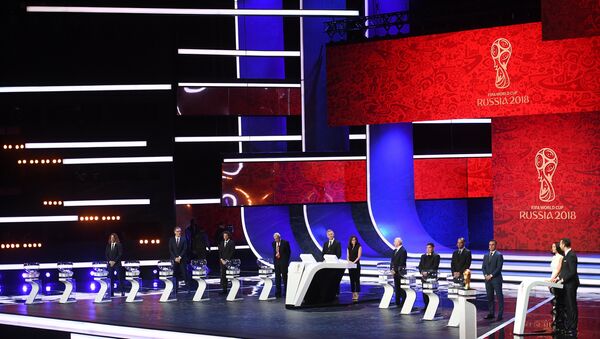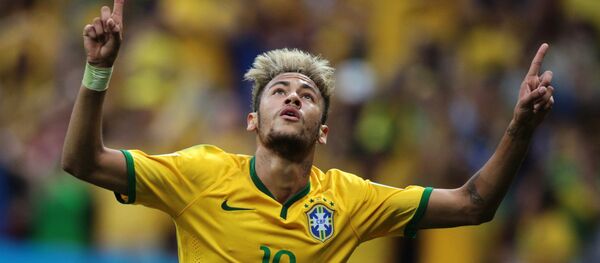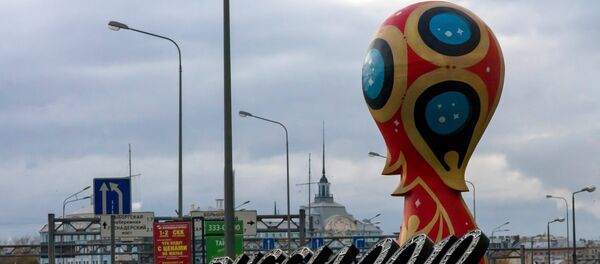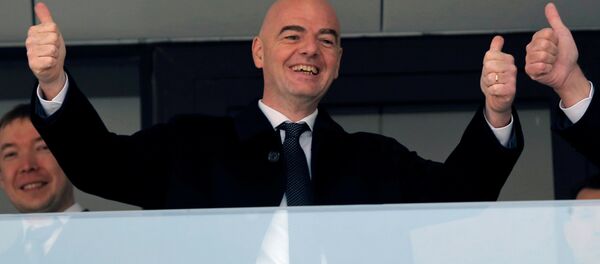Twelve venues located in 11 cities have been preparing for the event for the last 7 years, but it was this year when the most progress was made.
The country’s readiness to host the world championship was reaffirmed at the Confederations Cup this summer.
Confederation Cup 2017
The FIFA Confederations Cup was held from June 17 to July 2 in four Russian cities: Moscow, St. Petersburg, Kazan and Sochi.
READ MORE: Amazing View of 2018 FIFA World Cup Host Cities as Seen From Space (VIDEO)
This tournament is usually considered a prelude to the World Cup as it showcases the capacity of the host country to organize the quadrennial event at the highest level.
The eight competing teams were from the host country Russia, reigning World Cup champions Germany, as well as the six winners of the most recent FIFA confederation championships — Australia, Cameroon, Chile, Mexico, New Zealand and Portugal.
The final game as well as the closing ceremony took place in St. Petersburg on July 2. The German team scored one goal and defeated its opponent, Chile.
A total of 638,000 people came to 2017 FIFA Confederations Cup matches, the third largest recorded figure in the competition’s history.
According to FIFA data, 57,268 people attended the final Germany-Chile match in St. Petersburg.
This year’s Confederations Cup attendance was surpassed only by the 1999 tournament in Mexico (970,000 people) and the 2013 tournament in Brazil (804,659 people).
READ MORE: Russian Investigators Offer FIFA Cooperation in Russian Athletes' Doping Tests
Thousands of foreign football fans took advantage of the free transport program available to them in order to freely travel between the four Russian host cities, the Transport Directorate of FIFA World Cup Russia 2018 has said.
The Russian Railways company launched a total of 262 additional trains to run between the host cities, and transportation was free for football fans carrying both a FAN ID and match ticket.
Supporters from all seven guest countries participating in the tournament admitted that it felt “like home” in Russia and praised the country for its warm welcome.
"A spectator experience study conducted by Nielsen … found that 98 per cent of spectators enjoyed their experience at Russia 2017. Having attended, 91 per cent said that they would now like to apply for tickets to the World Cup," FIFA said on its website on October 31.
According to the same poll, as many as 60 percent of foreign spectators said that the Cup had exceeded their expectations, while the 80 percent of fans stated that the tournament improved their opinion of Russia.
FIFA President Gianni Infantino had also expressed his satisfaction with the 2017 Confederations Cup.
"This Confederations Cup has been a great success from many points of view. We had been hearing before this tournament about a lot of 'problems' we would experience here. In fact we had some great games and a great atmosphere … If a problematic tournament looks like this one, well, I want to have many problematic tournaments going forward," the FIFA president said.
Infantino went on to point out that the "winners" of the Confederations Cup were the some 600,000 people who attended the matches, specifying that the average attendance was almost 38,000 per game. Infantino also commended the work of the more than 6,000 volunteers hailing from 78 countries.
Draw
The Final Draw for the 2018 FIFA World Cup took place in the concert hall at the Kremlin State Palace in Moscow on December 1. The ceremony was hosted by England's football legend Gary Lineker and Russian journalist Maria Komandnaya and attended by Russian President Vladimir Putin as well as a number of world-renowned football players, including Didier Drogba, Aleksandr Kerzhakov, Pele, Ronaldinho, Ronaldo and Peter Schmeichel.
READ MORE: 2018 FIFA World Cup Players to be Created of Porcelain
During the event, 32 national teams were drawn into eight groups of four.
Group A consists of Russia, Saudi Arabia, Egypt and Uruguay; Group B — Portugal, Spain, Morocco and Iran; Group C — France, Australia, Peru and Denmark; Group D — Argentina, Iceland, Croatia and Nigeria; Group E — Brazil, Switzerland, Costa Rica and Serbia; Group F — Germany, Mexico, Sweden and South Korea; Group G consists of Belgium, Panama, Tunisia and England; and Group H — Poland, Senegal, Colombia and Japan.
During the Final Draw, Putin expressed hope that football fans arriving to Russia for the 2018 FIFA World Cup would get unforgettable impressions of both the games and the country.
"We believe that those who will arrive in Russia to support their teams will get unforgettable impressions. They will not only watch the matches with global football stars with their own eyes, but… have an opportunity to feel our traditional hospitality, given that the marches will take place in 11 Russian cities, and the fans will have an opportunity to visit several regions of such a big and diverse country," the Russian president said.
Russia is determined to hold the World Cup at the highest level, Putin stressed.
"Our country is looking forward to the World Cup and is determined to hold it at the highest level, allowing the leading football players to show a really good game," Putin said.
World Cup Stadiums
Each of the World Cup stadiums is scheduled to host four group stage matches. As for the knockout stage, Moscow’s Luzhniki and Otkritie stadiums, as well as arenas in St. Petersburg, Samara, Rostov-on-Don, Kazan, Nizhny Novgorod and Sochi will host Round 16 matches, with quarterfinals scheduled to be held in the latter four cities.
READ MORE: Final Draw for 2018 FIFA World Cup as it Unfolded (PHOTO, VIDEO)
The final leg of the World Cup will culminate in the country’s two largest cities: Moscow – where Luzhniki stadium will host one semifinal and the final match; and St. Petersburg –where the Saint Petersburg Stadium will host the other semifinal and the third-place match.
The readiness of Moscow’s Otkritie Stadium (45,360-person capacity), Sochi’s Fisht Stadium (47,659), the Saint Petersburg Stadium (68,134) and Kazan Arena (45,379) were affirmed at the Confederations Cup.
The Luzhniki Stadium (81,000) already hosted the first exhibition match between Russia and Argentina (0:1) on November 11.
On December 1, Russian Deputy Prime Minister Vitaly Mutko said that the overall readiness of stadiums for the World Cup stood at 85 percent, with only the Samara Arena (44,918) lagging 1-1.5 months behind schedule.
"All the stadiums are in a hard work schedule. We are to commission stadiums this year, then from January to April — launching, creation of temporary infrastructure around the stadiums and ensuring their compliance to FIFA requirements. We must hold three test matches in each arena, and on May 14, they will be transferred to FIFA’s disposal," Mutko said.
Most recently, the Kaliningrad Stadium’s (35,212) readiness was assessed at 89 percent in mid-November, while the Yekaterinburg Central Stadium (35,696) was 98 percent ready on December 1.
The Volgograd Arena (45,568), Nizhny Novgorod Stadium (44,899), Mordovia Arena (44,442) in Saransk and Rostov Arena (45,000) in Rostov-on-Don are also almost entirely ready to host the Cup, according to recent reports.
Teams Choose Where to Stay
Some teams participating in the World Cup in Russia have already marked down their picks for a base for their stay in Russia next summer.
The host team, Russia, will per tradition be accommodated at the Novogorsk training center in Khimki, a city in the Moscow Region, Mutko, who is also head of Russia's national soccer union, has said.
The incumbent champions, German national football team, will be based in Vatutinki during the tournament, the German Football Association (DFB) said on its website.
The Mexican team will be the Russian team’s neighbor, as it has reportedly decided to stay at the Dynamo Moscow FC training base, which is also located at Novogorsk.
The Argentinian team also plans on staying in the Moscow Region for the World Cup, specifically at the Bor health center south of Moscow, a source told R-Sport agency in early October. The Portuguese players will stay in the town of Bronnitsy, located southeast of Moscow, at a training center of the same name, while the French national team has reportedly picked one of the hotels in the town of Istra, some 25 miles west of the Russian capital.
The English national team has reportedly chosen a quiet place in the town of Repino near Saint Petersburg.
Some of the teams preferred the Black Sea coast in southern Russia. The Cup’s top seeds, Germany and Brazil, might stay at one of the luxurious hotels in the resort city of Sochi, which hosted the 2014 Winter Olympics. The Swedish squad will also train near Sochi, while the Icelanders have chosen the coastal city of Gelendzhik. The Saudi Arabia team has reportedly chosen the city of Grozny in Russia’s Chechen Republic, mostly due to strong ties between the Saudis and the region’s leaderships.
Fan Houses, Fan ID
Russia will open information centers for fans and tourists planning to attend the World Cup in a number of cities in the United Kingdom, Germany, France, Italy, Spain, China as well as the countries of Latin America, Deputy Director of Russia's humanitarian cooperation agency Rossotrudnichestvo Aleksandr Radkov told Sputnik in early July.
When the World Cup kicks off in Russia, the information centers will transform into fan zones where matches will be aired.
The Russian Fan House 2018, dedicated to the upcoming FIFA World Cup 2018, opened on December 4 at the Russian House of Science and Culture in Berlin. This fan zone is the first of its kind in Europe.
READ MORE: Key Witness Claims FIFA Official Received $1Mln Bribe to Back Qatar Cup Bid
The press attache of the Russian embassy in Berlin, Denis Mikerin, stressed that when applying to be the host of the 2018 World Cup, Russia was required to allow every fan with a valid ticket, for which a FAN ID is issued, into the country visa-free.
The FAN ID is a personalized card which is part of an identification system for football fans. Everyone who buys a ticket for any World Cup game has to obtain a FAN ID.
The FAN ID also allows incoming fans to arrive to Russia visa-free ten days before the start of the tournament (June 4) and remain in Russia for ten days after the end of the tournament (July 25).
Some 80,000 FAN ID applications have already been submitted, Russian Deputy Prime Minister Mutko said on December 7.
Tickets
There are four price categories offered for World Cup matches. The first is the most expensive, with prices ranging from 12,600 rubles ($213) for group stage matches to 66,000 rubles for the final. The fourth and cheapest category, with prices ranging from 1,280 rubles for the group stage to 7,040 rubles for the final, is reserved exclusively for Russian residents.
During the first sales phase 742,760 tickets were sold, with 47 percent of tickets bought by non-Russian citizens.
The most tickets were bought by football fans from the United States (43,555), Brazil (31,404), Germany (27,677), China (21,292), Mexico (19,334) and Israel (15,700).
Over 1.3 million requests for tickets were submitted within the first day of the second sales phase, FIFA said on December 6.
According to the Moscow Mayor’s Office, football fans as well as official FIFA delegations had booked more than 40,000 rooms in Moscow’s hotels for the World Cup by end-October. This means that approximately 60 percent of the 67,000 hotel rooms available in the capital have been reserved.
More than 500 additional trains will be launched by Russian Railways between the host cities during the World Cup. A fan with a valid ticket and FAN ID can reserve free railway tickets for trains headed to the host cities. The schedule of these trains will be finalized after December 15, after which fans and journalists will be able to book their tickets at tickets.transport2018.com.
World Cup Unaffected by IOC Olympic Ban
The decision of the International Olympic Committee (IOC) to ban the Russian national team from the 2018 Winter Olympic Games will not affect the 2018 FIFA World Cup in Russia, Mutko said on December 7.
"This situation has no influence at all… These are two completely different things. FIFA made a statement today. This has nothing to do with the World Cup. FIFA is a separate project, we have separate relations. It is satisfied with its interaction with the [Russian] government, organizing committee and the way we held the Final Draw," Mutko told reporters.
The FIFA press service said on December 5 that it had taken note of the IOC’s decision, clarifying that it had no impact on the preparations for the 2018 FIFA World Cup.






